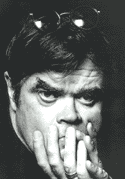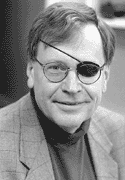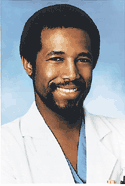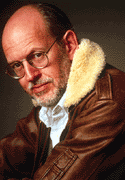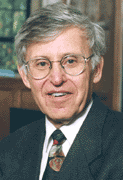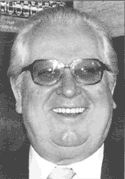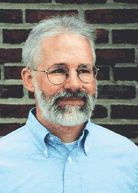
 |
||
The Yale Alumni Magazine is owned and operated by Yale Alumni Publications, Inc., a nonprofit corporation independent of Yale University. The content of the magazine and its website is the responsibility of the editors and does not necessarily reflect the views of Yale or its officers. |
On three consecutive Mondays in April at the University Theater, humorist Garrison Keillor spun stories about “A Life in Comedy.” On the first night, the Wobegonian said he wouldn’t mention his stint at Yale on his résumé: “It’s the dummies who sit on the dais—the smart people sit in the dark, near the exits.” Keillor read of love and loss from photocopied book pages, dropping them on the stage as he went and grinning widely at his own punchlines. Then he led a singalong of Elvis Presley’s “Can’t Help Falling in Love” before telling the audience, “I love you. Goodnight.”
Electrical engineering professor Jerry Woodall is one of five winners of this year’s National Medal of Technology, awarded annually by the president of the United States. Woodall was cited for inventing the light-emitting diode (LED) devices seen in consumer products, high-speed transistors for cell phones and satellites, and a weight-efficient solar cell. He came to Yale in 1999 after spending much of his career at IBM’s Thomas J. Watson Research Center and at Purdue University.
The crowd that filled Woolsey Hall, the Law School Auditorium, and part of Beinecke Plaza on April 13 wasn’t there for a rock star, but for neurosurgeon and Yale Corporation fellow Benjamin Carson '73. In a frank, funny talk about his own rise from poverty, Carson told the audience, composed mainly of New Haven schoolchildren and their families, to stick to the books and avoid excuses. Each student who attended received a copy of Carson’s autobiography, Gifted Hands.
A director (Bowfinger) and actor (The Blues Brothers), Frank Oz is best known as a puppeteer and as the voice of such puppets as Miss Piggy and Yoda. At a Morse College master’s tea on April 23, Oz charmed the crowd by speaking briefly in each of his famous characters' voices. He said that after Muppets founder Jim Henson convinced him to forgo journalism in favor of puppetry at the age of 17, it took him four years to try doing voices. “I was frightened, but Jim pushed me,” Oz said. “I won’t have a relationship like that ever again.”
Stuart Schwartz, a history professor who specializes in the study of colonial Brazil, has been named master of Ezra Stiles College. His wife Maria Jordan, a senior lector in Spanish, will serve as associate master. Schwartz and Jordan will be on leaves of absence in the next academic year and will take up residence in Stiles in 2003. In the interim, English professor Traugott Lawler and his wife Peggy will reprise their roles as master and associate master, respectively.
Carl Bauer, who was general manager of Mory’s for 17 years, died of cancer on May 27, just two months after resigning his post. He was 71 years old. Bauer got his start in Germany at age five, drawing beers in his father’s establishment while standing on top of a cake box. He came to the United States in 1950 and got a job in a Horn & Hardart Automat. He worked his way up through a number of positions in private clubs before coming to Mory’s in 1985. He is survived by two sons and a sister. Close-Up The Peabody Museum of Natural History has had a mere 17 directors in its 136-year history, and next January, botanist Michael J. Donoghue will join that elite company. Donoghue, the G. Evelyn Hutchinson Professor of Ecology and Evolutionary Biology and the current chairman of EEB, succeeds Richard Burger, a professor of anthropology who has been Peabody director since 1994.
“I’m certainly no stranger to museums,” says Donoghue, who directed the Harvard Herbarium from 1995 to 1999 and made extensive use of its collection in wide-ranging research on plant evolution, biogeography, and the best way to classify biological creation. Since coming to Yale two years ago, Donoghue has mined the Peabody’s holdings."There are a number of world-class collections here,” he says, “and taken together, the material in museums like the Peabody is invaluable because it represents our baseline knowledge of everything there is in the world.” The move of specimens into better storage facilities in the Class of 1954 Environmental Science Center (see May) and new technologies mean that collections can yield unexpected secrets, says Donoghue. He plans to continue Burger’s efforts to train area teachers and revamp exhibits, even the venerable Hall of Dinosaurs. “A key role is to inform and educate people,” he says.
"In many ways, the Peabody is well positioned to be a world leader.” |
||||||||||||||||
|
|
|
|
|
|
|
|
©1992–2012, Yale Alumni Publications, Inc. All rights reserved. Yale Alumni Magazine, P.O. Box 1905, New Haven, CT 06509-1905, USA. yam@yale.edu |
||
